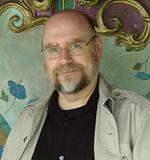 Robert Charles Wilson is the Hugo Award winning author of Spin
Robert Charles Wilson is the Hugo Award winning author of Spin. Darwinia won Canada’s Aurora Award, The Chronoliths won the John W. Campbell Award, and Blind Lake is a New York Times Notable Book. All three were Hugo finalists. His latest novel, Burning Paradise, is a fine example for why Stephen King calls him “A Hell of a Storyteller.”
About Burning Paradise:
Cassie Iverson, eighteen years old, lives in the United States in the year 2014 — but it’s not our United States, and it’s not our 2014.
Cassie’s world has been at peace since the Great Armistice of 1914. There was no World War II, no Great Depression. Poverty is declining, prosperity is increasing. But Cassie knows the world isn’t what it seems. Her parents were killed for this knowledge, and Cassie lives in hiding with her younger brother Thomas and their aunt Nerissa. For seven years they have attempted to lead unexceptional lives in order to escape detection. The tactic has worked.Until now. Because the killers are back. And they’re not human.
Praise for Burning Paradise:
Robert Charles Wilson is a Canadian writer whose work combines finely nuanced character development with some very high-concept sci-fi ideas… The serious issues Wilson raises involve the cost of freedom, the value of free will, and the question of whether we ought to accept a peaceful world at any price.
— The Chicago Tribune
The Hugo Award-winning author of Spin has written a story of gradual suspense and quiet terror, with believable characters and a compelling plot.
— Library Journal
Tim Ward: Burning Paradise has a wonderful mix of alternate history, a secret alien power ruling behind the scenes and likable characters. Would you break down each of these areas as far as they excited you to tell this story?
Robert Charles Wilson: Those aspects of the book talk to each other thematically, so it’s a little hard to split them apart — and even harder to talk about them without getting into plot spoilers. But I’ll try.
The “paradise” of the title isn’t a conflict-free world. It’s a version of our own world in which people consistently made slightly better choices, the cumulative effect of which was a 20th century without global wars or such horrors as the Holocaust. I have to believe that this scenario is within the realm of human possibility — I’m not cynical enough to say it isn’t — but it’s difficult to construct on purely historical grounds. Of course, in the book, it’s not a purely human construction!
The alien presence interested me because it isn’t obviously either hostile or benevolent. What do you make of an organism that has prevented widespread human tragedy but coldly murdered members of your family? How do you organize your life around a secret knowledge that might at any moment make you a target?
That’s the ambiguity the characters have to grapple with, and it’s not an abstraction for them, it’s a full-on existential threat. Which makes it a great theater of character, if you know what I mean.
TW: For fans of alien stories, what will they enjoy about Burning Paradise?
RCW: It was fascinating to try to invent an alien entity (or entities) more complex than human beings and capable of manipulating them, but utterly without what we think of as a mind — pure process, no self-consciousness.
“The philosophical zombie” is a kind of thought experiment occasionally raised in discussions of the philosophy of consciousness: a creature capable of behaving in a way so plausibly human that we infer, incorrectly, that it possesses a mind. (Also called “the philosopher’s zombie,” which is maybe the better term. “Philosophical zombie” suggests to me one of those Walking Dead types, sort of shrugging and saying, “Hey, it could be worse…”) So my alien entity is a kind of philosopher’s zombie, incapable of real pain, pleasure, thought, or (importantly) moral choice. As devoid of personal knowledge as an ant colony. A completely amoral organism — not innately immoral, not malevolent, simply beyond moral discourse altogether.
TW: For readers who don’t necessarily choose stories with aliens, why should they read Burning Paradise?
RCW: I hope the aliens in Burning Paradise raise real questions about our own minds, how we relate to and think about others, how we make moral decisions, the function of love, and the nature of human mutuality.
TW: Setting Burning Paradise up on the shelf with your other works, how does this story stand out among the rest, and in what ways does it exhibit your trademark contribution to Science Fiction?
RCW: I’m not sure I’m equipped to answer those questions objectively. But I guess I have a reputation for science fiction that explores the boundary between the personal and the cosmic, and you could put this book on that shelf. In several works, most notably Spin and its sequels, I’ve tried to imagine the existence and consequences of a galactic ecology. Burning Paradise, in part, is a darker take on that theme.
Bob
Follow along with Bob and his stories at his website, Facebook, Goodreads and on Twitter.
—————————————————————————————————————————————————
 Timothy C. Ward
Timothy C. Ward

Timothy C. Ward has been podcasting since 2010, first as AudioTim, and now with AISFP. His first publication, Cornhusker: Demon Gene (A Short Story)
, is available on Kindle for $.99. His novel in progress, Kaimerus, is described as “Firefly crashes on Avatar and wakes up 28 Days Later.” Sign up to his author newsletter for updates on new releases.
Subscribe to Adventures in SciFi Publishing podcast on: iTunes | Stitcher Radio (Android users) | RSS | Website RSS


















Speak Your Mind